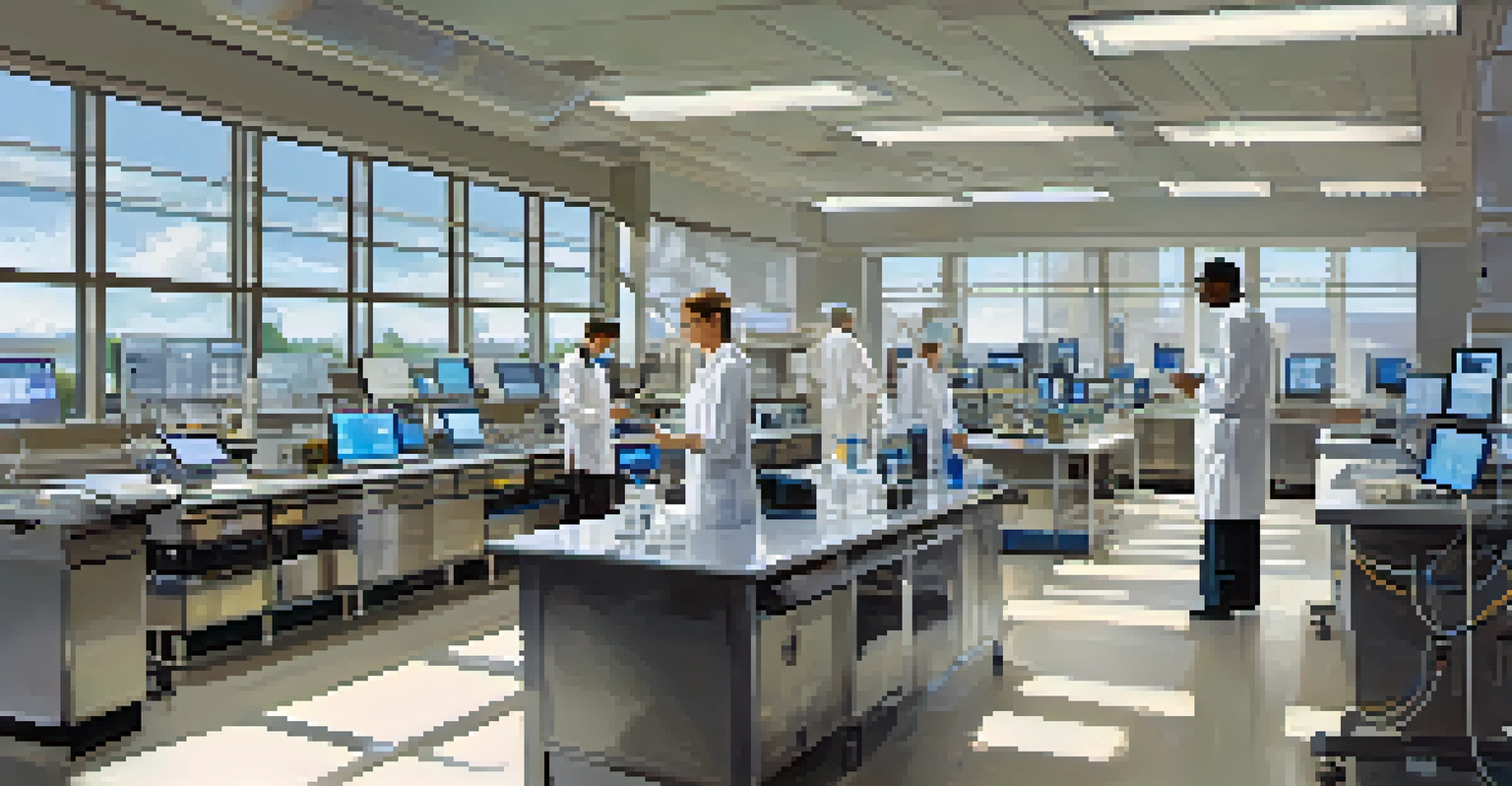The Rise of Research Institutions in St. Louis: Innovations Ahead

St. Louis: A Hub for Research and Innovation
St. Louis has emerged as a vibrant hub for research and innovation, attracting attention from across the nation. With a rich history in science and technology, the city has become home to leading research institutions that are pushing the boundaries of knowledge. This environment fosters collaboration between universities, private sectors, and healthcare institutions, creating a dynamic ecosystem ripe for breakthroughs.
Research is creating new knowledge.
One significant factor in this growth is the presence of renowned organizations like Washington University in St. Louis and the Missouri Botanical Garden. These institutions not only contribute to research but also serve as catalysts for local economic development. By attracting top talent and securing substantial funding, they enhance St. Louis's reputation as a center of excellence in research.
Moreover, the city’s strategic location and supportive infrastructure make it an attractive destination for startups and established companies alike. As more entities recognize the potential for collaboration and innovation here, St. Louis continues to solidify its standing on the national stage.
Key Players in St. Louis's Research Scene
Several key players are driving the research landscape in St. Louis, each contributing unique strengths and expertise. Institutions like the Donald Danforth Plant Science Center focus on agricultural research, addressing global challenges like food security and sustainability. Their innovative approaches and cutting-edge technologies are setting new standards in plant science.

In addition, organizations like the St. Louis Science Center engage the public, promoting a culture of curiosity and education. By hosting events and workshops, they inspire the next generation of scientists and researchers, ensuring a continuous pipeline of talent. This emphasis on education and outreach is crucial for maintaining St. Louis's research momentum.
St. Louis Thrives in Innovation
The city has become a vibrant hub for research and innovation, driven by collaboration among universities, private sectors, and healthcare institutions.
Furthermore, partnerships between these institutions and the private sector are becoming increasingly common. Collaborations with biotech companies and healthcare providers not only drive research but also translate discoveries into real-world applications, benefiting the community at large.
Innovative Research Areas Gaining Traction
St. Louis is witnessing groundbreaking research across various fields, particularly in biotechnology and health sciences. Institutions are developing novel therapies and treatments that could revolutionize patient care, showcasing the city’s commitment to improving health outcomes. This focus on innovation is attracting significant investment and interest from pharmaceutical companies.
Innovation distinguishes between a leader and a follower.
Moreover, research in environmental sciences is gaining traction, with efforts aimed at combatting climate change and promoting sustainability. Projects focusing on urban agriculture, renewable energy, and conservation are not only addressing pressing global issues but also enhancing local quality of life. This intersection of research and social responsibility is a hallmark of St. Louis's evolving identity.
The city's diverse research landscape also encompasses fields like robotics and artificial intelligence. As technology continues to advance, institutions are exploring new ways to integrate these innovations into everyday life, paving the way for a smarter, more connected future.
The Role of Funding in Research Growth
Funding plays a crucial role in the growth of research institutions in St. Louis. Grants from federal agencies, private foundations, and corporate partnerships provide the financial support necessary for groundbreaking research. These funds enable institutions to pursue ambitious projects that might otherwise be unattainable, fueling innovation and discovery.
Additionally, local and state governments are increasingly recognizing the importance of investing in research. Incentive programs and tax breaks for research-focused companies help stimulate economic growth while fostering a favorable environment for scientific advancement. This proactive approach is essential for maintaining the city’s competitive edge.
Collaborative Research Landscape
Key players in St. Louis, such as the Donald Danforth Plant Science Center, foster collaboration that addresses global challenges while enhancing local economic growth.
Philanthropy also contributes significantly to research funding in St. Louis. Generous donations from individuals and organizations not only support specific projects but also help establish endowments that ensure long-term sustainability. This culture of giving reflects the community’s commitment to fostering a vibrant research ecosystem.
Collaboration Between Research Institutions
Collaboration is at the heart of St. Louis's research scene, with institutions often working together on interdisciplinary projects. By pooling resources and expertise, these collaborations lead to more comprehensive solutions for complex challenges. This spirit of cooperation is essential in today's research landscape, where many issues require a multifaceted approach.
An example of this collaboration is the St. Louis Collaborative for Advanced Healthcare, which brings together various institutions to tackle pressing health issues. By leveraging each member's strengths, the collaborative is able to conduct impactful research that benefits the entire community. This synergy not only enhances research outcomes but also strengthens the local economy.
Furthermore, partnerships with international research entities are becoming increasingly common. These global collaborations allow St. Louis institutions to share knowledge and resources, expanding their reach and impact. Such connections are vital for addressing worldwide challenges, positioning St. Louis as a key player in the global research arena.
The Impact on Local Economy and Workforce
The rise of research institutions in St. Louis has a profound impact on the local economy, creating jobs and attracting talent. As these institutions grow, they require skilled professionals, leading to an increase in demand for jobs in research, technology, and healthcare. This influx of opportunities benefits the community, providing stable employment and fostering economic resilience.
Moreover, the growth of research facilities often stimulates the development of surrounding areas. As businesses and startups cluster around these institutions, local economies thrive, creating a vibrant ecosystem for innovation. This not only enhances the quality of life for residents but also positions St. Louis as an attractive destination for new businesses.
Future Focus on Sustainability
St. Louis's commitment to sustainable practices positions it to tackle societal challenges and attract investment in future research initiatives.
Additionally, the focus on education and workforce development ensures that local residents are well-prepared for the jobs of the future. Partnerships between research institutions and educational organizations help align training programs with industry needs, equipping the workforce with relevant skills. This investment in human capital is essential for sustaining the city's research-driven growth.
Future Prospects: What's on the Horizon?
As St. Louis continues to grow as a research hub, the future looks promising. Ongoing investments in infrastructure and technology will further enhance the city’s capacity for innovation. With a commitment to research and development, St. Louis is well-positioned to lead in various fields, from healthcare to environmental science.
Looking ahead, the emphasis on sustainable practices and social responsibility is likely to shape the research agenda. Institutions are increasingly focusing on projects that address societal challenges, ensuring that their work benefits both the community and the planet. This alignment with global priorities will attract even more interest and investment.

Ultimately, the rise of research institutions in St. Louis signals a transformative era for the city. By fostering a culture of innovation and collaboration, St. Louis is not just keeping pace with national trends but setting the stage for a future rich in discoveries and advancements.